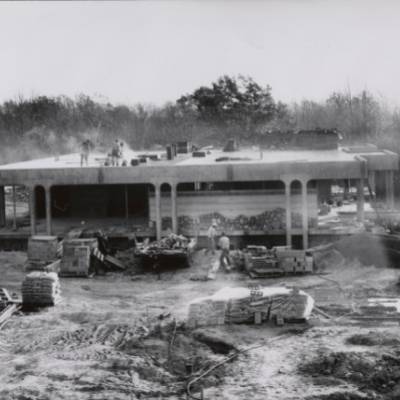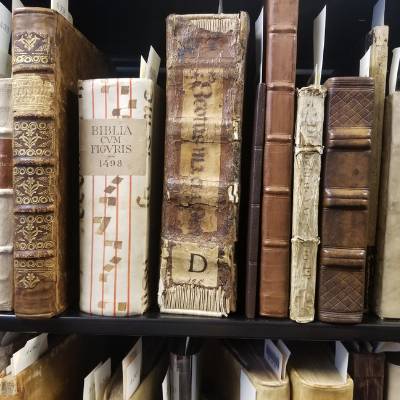What's Available
Find out more about the materials in Special Collections and University Archives
Special Collections and University Archives is divided into several different types of collections:
- Special Collections contains groups of records related to themes, topics, or people that are relevant to Grand Valley State University student and faculty research and/or local history
- University Archives contains records related to Grand Valley State University's history
- Rare Books contains books that do not circulate outside of Seidman House due to their rarity, value, or fragility
- Digital Collections contains portions of both Special Collections, University Archives, and Rare Books and are available online for research use
- University Publications contains student newspapers and other publications of Grand Valley State University, available online via our institutional repository
Search Help
Finding Aids
Searching Special Collections and University Archives is different from the library. Instead of a catalog we use "finding aids" that provide context for collection materials as well as other relevant information and, often, inventory lists of collection contents:
- Download the Step-by-step guide to searching our archival finding aids (PDF)
- Learn how to read a finding aid with our Anatomy of a Finding Aid guide (PDF)
Remember, you can search online to find what you'd like to use, but physical materials must be used onsite.
General Search Tips
- Try different keywords and combinations of words. Be flexible!
- Try variations of personal names. Sometimes it's easiest to put in only the last name or search a whole names in quotes.
- Use the "Subjects" heading to find the best terminology for your search.
Words to Know
It can feel confusing to use archival resources when you don't understand the jargon! Here are some of the most useful words to know for archival research:
- Archives: Records created or received by a person, family, or organization and preserved because of their continuing value
- Special Collections: A cohesive collection of non-circulating research materials held together by provenance or thematic focus
- Finding Aid: A descriptive tool providing information about a particular record or collection
- Provenance: Where the record came from. This could include who created it, previous owners, or storage locations
- Metadata: Data about data. Metadata is used to classify, manage, and describe digital resources
- Series: Similar records grouped together because they are created, used, or received in a related way
- Manuscript: Any handwritten or unpublished text
- Digitized: A paper or analog record that has been scanned onto a computer
More definitions can be found at the Society of American Archivist's Glossary.
Ready to start searching our collections? Find step-by-step guides for searching our other collections below.
More Search Guides
- Guide to Searching Digital Collections
- Guide to Searching Rare Books
- Guide to Searching University Publications in our institutional repository
In Your Research
Primary Sources
Special Collections and University Archives holds mainly primary sources. Primary Sources are direct, firsthand evidence about an event, topic, or person. A primary source is the subjective interpretation of a witness to an event. The Library of Congress defines them as the "raw materials of history". Primary sources include everything from diaries, letters, manuscripts, audio and video recordings, speeches, artwork, interview, surveys, emails, scientific research results, census records, etc.
If you are analyzing or interpreting primary sources for your research, you may find these resources useful:
Archival Statements for Traumatic Materials
We acknowledge that materials within our collections may be traumatic for our users. We encourage you to exercise mental and emotional self-care when interacting with potentially disturbing or traumatizing materials.
Citations and Copyright
Use our Archival Citations handout (PDF) to make sure you have all the information you need for accurate citations.
Or, visit our Citations and Copyright page for more information.
Accessing Materials
Conduct onsite research with the materials available in Seidman House
Contact us before visiting
Our Reading Room has limited space. Setting up an appointment helps us ensure that you have space to research, and that the materials you would like to use are ready and waiting. Archivists may know if there are related materials in our collections, other collections, or available online for you to access as well.
See our Reading Room use policy to prepare for a visit.
Frequently Asked Questions
Unsure what to do? Ask an archivist for assistance!
Unfortunately not. Digitization takes a lot of staff time and resources, and digital objects need ongoing care to ensure future use. All of this means, only a fraction of our total holdings has made it online. We try to take research use into consideration when determining which collections are a priority for digitization. If you have questions about receiving reference scans for your research of undigitized materials, contact [email protected] for more information about the process.
Materials kept in Special Collections and University Archives do not circulate. This means they must be used in our Reading Room.
No. Those kinds of records are kept by the Registrar's Office. Contact their office.
No. The Seidman College of Business is located on the Grand Rapids campus.
If you're really interested, the names come from two different Seidmans! The Business College is named after Francis E. Seidman, father of GVSU Founder L. William Seidman, while Seidman House gets its name from the Thomas Erler Seidman Foundation.
We do not sell materials that are part of the archival collections. You can contact the Alumni Office to see if they have extra copies.
These records may be kept by individual departments, but are not typically kept in the archives.





[1630514277].jpg)